Glenn Dennis(Glenn DENNIS). |
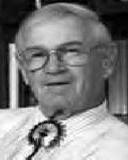
|
Please, before asking any question or sending any comment or criticism, read this.
Glenn Deniis was employed in 1947 as mortician at the Ballard Funeral Home in Roswell.
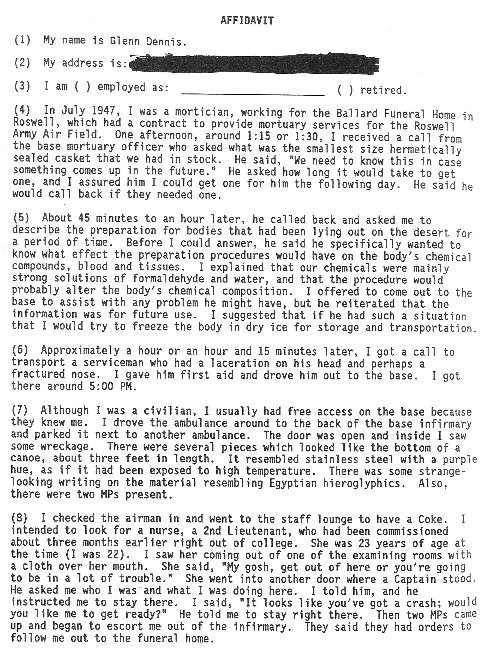 |
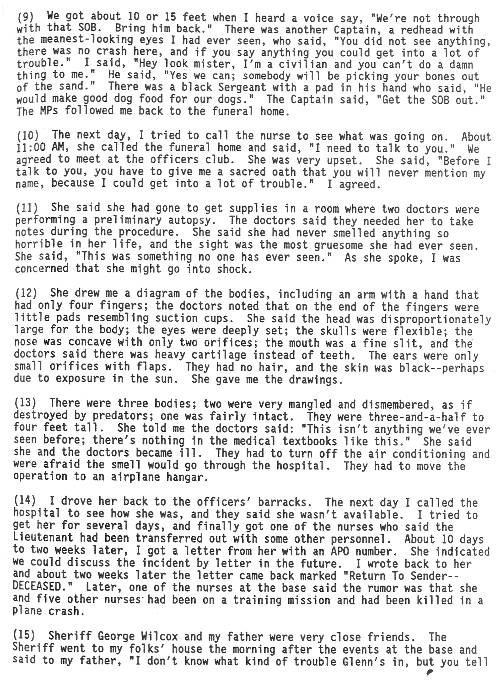 |
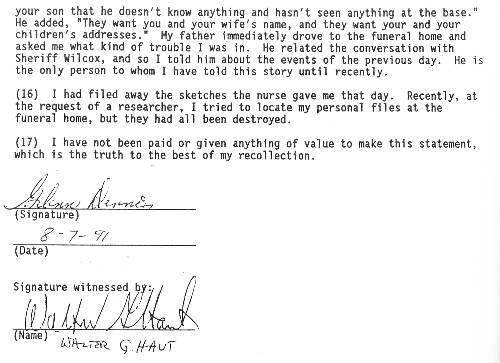 |
AFFIDAVIT
1) My name is Glenn Dennis
(2) My address is: XXXXXXXXXX
(3) I am ( ) employed as: ____ ( ) retired,
(4) In July 1947, I was a mortician, working for the Ballard Funeral Home in Roswell, which had a contract to provide mortuary services for the Roswell Army Air Field. One afternoon, around 1:15 or 1:30, I received a call from the base mortuary officer who asked what was the smallest size hermetically sealed casket that we had in stock. He said, "We need to know this in case something comes up in the future." He asked how long it would take to get one, and I assured him I could get one for him the following day. He said he would call back if they needed one.
(5) About 45 minutes to an hour later, he called back and asked me to describe the preparation for bodies that had been lying out on the desert for a period of time. Before I could answer, he said he specifically wanted to know what effect the preparation procedures would have on the body's chemical compounds, blood and tissues. I explained that our chemicals were mainly strong solutions of formaldehyde and water, and that the procedure would probably alter the body's chemical composition. I offered to come out to the base to assist with any problem he might have, but he reiterated that the information was for future use. I suggested that if he had such a situation that I would try to freeze the body in dry ice for storage and transportation.
(6) Approximately a hour or an hour and 15 minutes later, I got a call to transport a serviceman who had a laceration on his head and perhaps a fractured nose. I gave him first aid and drove him out to the base. I got there around 5:00 PM.
(7) Although I was a civilian, I usually had free access on the base because they knew me. I drove the ambulance around to the back of the base infirmary and parked it next to another ambulance. The door was open and inside I saw some wreckage. There were several pieces which looked like the bottom of a canoe, about three feet in length. It resembled stainless steel with a purple hue, as if it had been exposed to high temperature. There was some strange-looking writing on the material resembling Egyptian hieroglyphics. Also there were two MPs present.
(8) I checked the airman in and went to the staff lounge to have a Coke. I intended to look for a nurse, a 2nd Lieutenant, who had been commissioned about three months earlier right out of college. She was 23 years of age at the time (I was 22). I saw her coming out of one of the examining rooms with a cloth over her mouth. She said, "My gosh, get out of here or you're going to be in a lot of trouble." She went into another door where a Captain stood. He asked me who I was and what I was doing here. I told him, and he instructed me to stay there. I said, "It looks like you've got a crash; would you like me to get ready?" He told me to stay right there. Then two MPs came up and began to escort me out of the infirmary. They said they had orders to follow me out to the funeral home.
(9) We got about 10 or 15 feet when I heard a voice say, "We're not through with that SOB. Bring him back." There was another Captain, a redhead with the meanest-looking eyes I had ever seen, who said, "You did not see anything, there was no crash here, and if you say anything you could get into a lot of trouble." I said, "Hey look mister, I'm a civilian and you can't do a damn thing to me." He said, "Yes we can; somebody will be picking your bones out of the sand." There was a black Sergeant with a pad in his hand who said, "He would make good dog food for our dogs." The Captain said, "Get the SOB out." The MPs followed me back to the funeral home.
(10) The next day, I tried to call the nurse to see what was going on. About 11:00 AM, she called the funeral home and said, "I need to talk to you." We agreed to meet at the officers club. She was very upset. She said, "Before I talk to you, you have to give me a sacred oath that you will never mention my name, because I could get into a lot of trouble." I agreed.
(11) She said she had gone to get supplies in a room where two doctors were performing a preliminary autopsy. The doctors said they needed her to take notes during the procedure. She said she had never smelled anything so horrible in her life, and the sight was the most gruesome she had ever seen. She said, "This was something no one has ever seen." As she spoke, I was concerned that she might go into shock.
(12) She drew me a diagram of the bodies, including an arm with a hand that had only four fingers; the doctors noted that on the end of the fingers were little pads resembling suction cups. She said the head was disproportionately large for the body; the eyes were deeply set; the skulls were flexible; the nose was concave with only two orifices; the mouth was a fine slit, and the doctors said there was heavy cartilage instead of teeth. The ears were only small orifices with flaps. They had no hair, and the skin was black--perhaps due to exposure in the sun. She gave me the drawings.
(13) There were three bodies; two were very mangled and dismembered, as if destroyed by predators; one was fairly intact. They were three-and-a-half to four feet tall. She told me the doctors said: "This isn't anything we've ever see before; there's nothing in the medical textbooks like this." She said she and the doctors became ill. They had to turn off the air conditioning and were afraid the smell would go through the hospital. They had to move the operation to an airplane hangar.
(14) I drove her back to the officers' barracks. The next day I called the hospital to see how she was, and they said she wasn't available. I tried to get her for several days, and finally got one of the nurses who said the Lieutenant had been transferred out with some other personnel. About 10 days to two weeks later, I got a letter from her with an APO number. She indicated we could discuss the incident by letter in the future. I wrote back to her and about two weeks later the letter came back marked "Return to Sender--DECEASED." Later, one of the nurses at the base said the rumor was that she and five other nurses had been on a training mission and had been killed in a plane crash.
(15) Sheriff George Wilcox and my father were very close friends. The Sheriff went to my folks' house the morning after the events at the base and said to my father, "I don't know what kind of trouble Glenn's in, but you tell your son that he doesn't know anything and hasn't seen anything at the base." He added, "They want you and your wife's name, and they want your and your children's addresses." My father immediately drove to the funeral home and asked me what kind of trouble I was in. He related the conversation with Sheriff Wilcox, and so I told him about the events of the previous day. He is the only person to whom I have told this story until recently.
(16) I had filed away the sketches the nurse gave me that day. Recently, at the request of a researcher, I tried to locate my personal files at the funeral home, but they had all been destroyed.
(17) I have not been paid or given anything of value to make this statement, which is the truth to the best of my recollection.
Signed: Glenn Dennis
Date: 8-7-91
Signature witnessed by: Walter G. Haut
At the time of the writing of the above affidavit, artist Walter Henn drew the following sketches under the direction of Glenn Dennis. The sketches are to depict the drawing allegedly made for Dennis by the nurse:
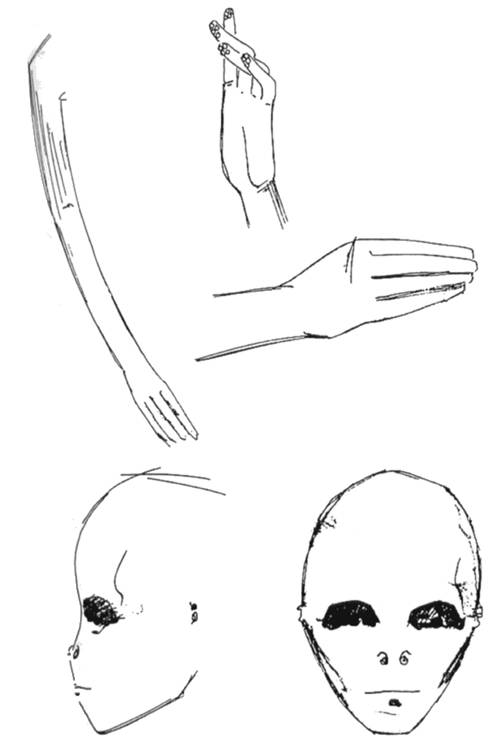
|
Larry King: | "We start in Roswell, New Mexico with two guys who were there, Walter Haut, who was the United States Air Force public information officer at Roswell Army Air Field, and Glenn Dennis, who was working at the Ballard Funeral Home in Roswell, New Mexico." |
[snip] |
|
Larry King: | "What call did you get, Glenn?" |
Glenn Dennis: | "I received a call from the mortuary officer, informing..." |
[snip - Larry king interrupts to introduce other items.] |
|
Larry King: | "Glenn, what call did you get?" |
Glenn Dennis: | "I received a call from the mortuary officer at the base, asking me how many infant hermetically sealed caskets we had, three-and-a-half to four feet, in stock. And I told him, I said..." |
Larry King: | "What did you make of that?" |
Glenn Dennis: | "...we only had one. It's not military. But I said, I can call the Amarillo, Texas, coffin company by 3:00 this afternoon and have all you need by noon tomorrow [Unintelligible] I said, "What's going on out there?" And he said, "That's not important." Then he calls me back later and he wants to know how embalming chemical would alter the tissues, the stomach contents, and what was our preparation [Unintelligible] bodies laying out in the elements for days. I said, Sir, we have to - the mortuary officer has to tell us what he wants and how he wants it and what procedure he wants us to follow. And he became a little bit upset. But anyway, that was the way that it all started off with me right there. |
[snip - Larry King interviews another guest and introduces further guests.] |
|
|
Larry King: | "Glenn, back to you. What was the follow-up? What was the eventual result? Did they ever order any of these caskets? Glenn?" |
Glenn Dennis: | "Yes?" |
Larry King: | "Did they order, did the Army Air Force ever order anything from the funeral home?" |
Glenn Dennis: | "No, sir, they did not. They did not order anything." |
Larry King: | "How do you know the Air Force was calling you?" |
Glenn Dennis: | "Well, because I knew the mortuary officer out there very well. We were close friends." |
Larry King: | "Oh." |
Glenn Dennis: | "And I knew all the people out there. We worked at the hospital. We had the only ambulance business, and we were involved quite a bit out at the base. Also, we had a military contract. So I knew them all." |
[snip - Larry King interviews other guests, and asks their opinions on the motives for a cover-up.] |
|
Larry King: | "Glenn, why do you think they are not releasing it?" |
Glenn Dennis: | "Well, from what I've been told, and being interviewed, the problem is that whoever has this energy could control the whole world and if we don't have the elements on our planet or anything else to reproduce these, then it could be a problem. I've heard this from three or four different sources and maybe that's true. I don't know. If you remember, the Orson Welles deal." |
Larry King: | "War of the Worlds." |
Glenn Dennis: | "Yes." |
Larry King: | "Yes." |
Glenn Dennis: | "And they didn't know if that would happen in New Mexico or around the world, or anything else if we were being invaded by aliens." |
[snip - Larry King interviews other guests.] |
|
Larry King: | "Now, Glenn, you still live, you live in Roswell. Do you believe there's..." |
Glenn Dennis: | "That's true..." |
[Crosstalk] |
|
Larry King: | "Do you believe there's still stuff there?" |
Glenn Dennis: | "Well, they go out every year, every year after all of the snows and the winter. These government people go out with Geiger counters and everything else, and they have this all marked off up there. And I don't know if they found anything else or not because they do not consult us anymore at all. But I do know the ranchers and I know people up there because our mortuary has been involved up there with most of it, I mean, with the people there, and very seldom will we ever talk about it. Once in a while, we'll sit down and mention something, but not very often." |
[snip - Larry King interviews other guests.] |
|
Larry King: | "Did you ever see anything in a coffin, Glenn?" |
Glenn Dennis: | "No, I did not. I did not see it. They were all shipped out in what we call body bags and put in a hermetically sealed container and was flown directly to Wright-Patterson." |
Larry King: | "Glenn, do you think we'll ever going to know the whole story?" |
Glenn Dennis: | "Well, not at the rate it's going now. There's some sightings just recently in Australia and New Zealand and also I have a call the other day that people that had been in Egypt visiting the pyramids and they shut them down for three or four days and no tourists going out there on a count of the sightings." |
Larry King: | "Go ahead, Glenn." |
Glenn Dennis: | "I don't know. I think more of the public understands this, the more they know about it, the better the whole world will be." |
[snip - Larry King interviews other guests.] |
|
Larry King: | "We thank Glen Dennis for spending all this time with us. He worked at the Ballard Funeral Home in Roswell when all this happened." |
Source:
Under construction.